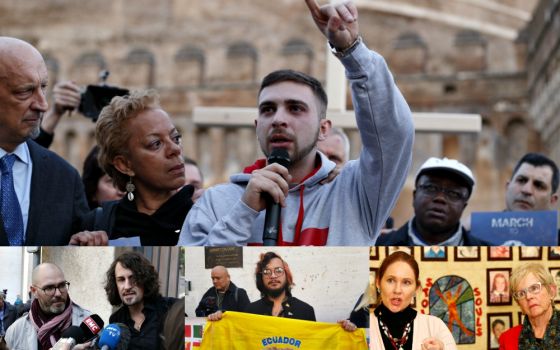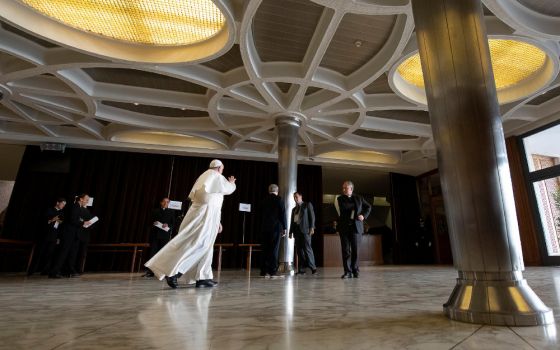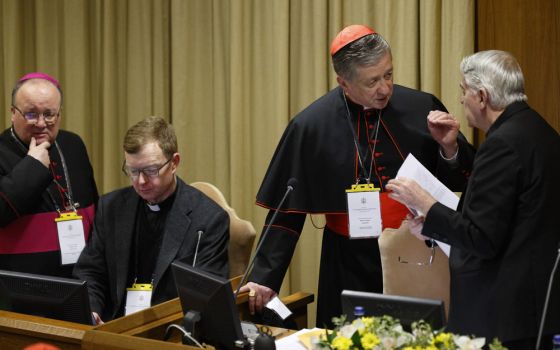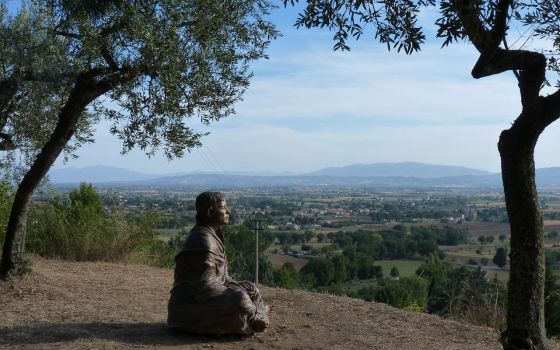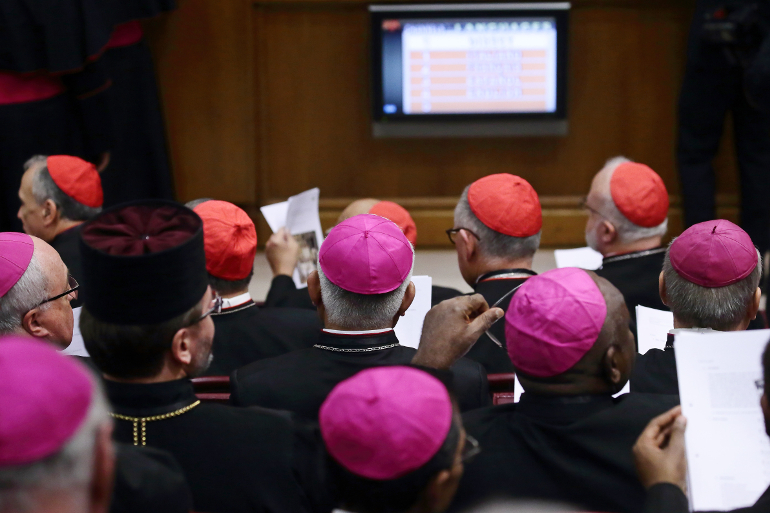
Prelates attend the opening session of the meeting on the protection of minors in the church at the Vatican Feb. 21. (CNS photo/Evandro Inetti, pool)
Pope Francis opened the highly anticipated global summit on Catholic clergy sexual abuse Feb. 21 by telling the hundreds of bishops he had called to Rome for the encounter that people expect them to consider "concrete and effective measures" to confront what he termed the "evil" of abuse.
In brief remarks beginning his four-day meeting on child protection with the heads of the world's bishops' conferences, the pontiff said he had not brought them together so they could issue "simple and predictable condemnations."
Francis told the 190 cardinals, bishops and heads of religious orders taking part in the first of its kind summit that they were coming together to "listen to the cry of the little ones who ask for justice."
"What falls on our meeting is the weight of pastoral and ecclesial responsibility that obliges us to discuss together, in a synodal, sincere and deep manner, how to confront this evil that afflicts the church," said the pope.
Francis spoke for only about two minutes at the start of the summit Feb. 21, before ceding the floor in the Vatican's Synod Hall to five video testimonies from abuse survivors. The pontiff is not expected to speak again publicly until the meeting closes Feb. 24.
Philippines Cardinal Luis Antonio Tagle spoke after the victims and focused his half-hour talk on the pain suffered by them. He spoke of their wounds in stark biblical terms, comparing the way Catholic bishops had treated survivors to the way the disciples had denied Jesus before his crucifixion.
Tagle, who choked up at several points is his speech, likewise acknowledged the church's "poor handling of these crimes" and said bishops must make "the commitment to do everything in our power and capacity to see that children and vulnerable people are safe."
Maltese Archbishop Charles Scicluna, who also serves as an adjunct secretary for the Vatican's Congregation for the Doctrine of the Faith, spoke after Tagle. His half-hour presentation amounted to a detailed, step-by-step walkthrough of how bishops should report accusations of abuse, and how his congregation evaluates such accusations.
Scicluna told the prelates that even when the Vatican office cannot successfully prosecute a case against a cleric credibly accused of abuse that they should use their authority to "guarantee the common good and ensure the effective safeguarding of children and young people."
"The faith community under our care should know that we mean business," said the archbishop. "They should come to know … we will protect them at all costs. We will lay down our lives for the flocks entrusted to us."
Each day of the first three days of the summit is focusing on a different theme, starting with responsibility, following with accountability, and then ending with transparency. Each day begins with a prayer service and includes three presentations, and then time for working in small language groups.
The Vatican is providing a live feed of the general presentations, but not of following brief question-and-answer session with the presenters, or the small group sessions. Although the city-state provided transcriptions of the testimonies of the five survivors, it is not providing the video itself or the names of the victims for reasons of privacy.
The first survivor's testimony exhorted the prelates to believe victims when they come forward.
"Victims need to be believed, respected, cared for and healed," said the person's prepared text. "You need to repair what has been done to the victims, be close to them, believe them and accompany them."
Another survivor referred to abuse scandals as a "time bomb" waiting to explode for the Catholic Church across Asia. "If want to save the Church, we need to get our act together," said that person's text.
Both Tagle and Scicluna encouraged the bishops taking part in the summit to meet personally with abuse survivors. Scicluna called such meetings "sacred ground, where we meet Jesus on the Cross."
The Maltese archbishop told the prelates that they must investigate all accusations of abuse without any "unnecessary delay." He also told them that they have an obligation to tell the Vatican if priests being considered as possible bishops lack proper understanding of the abuse crisis.
Withholding information from the Vatican during the bishop selection process, Scicluna said, "is a grave sin against the integrity of the episcopal ministry."
Francis' summit has been the subject of high expectations following renewed focus throughout 2018 on the decades-long clergy abuse crisis. The pope and Vatican officials have sought to downplay the expectations for the event, pointing to its brevity.
At a Feb. 18 press briefing, Scicluna said the summit would not solve all the problems in the church.
"If people are expecting that, that is an … irrational expectation," said the archbishop. "But then if you're expecting that there will be follow up, that is a reasonable expectation."
"Follow-up is going to be of the essence," he said.
Summit organizers met for more than two hours Feb. 20 with 12 abuse survivors, including Phil Saviano, who was crucial to the extensive reporting in 2002 on the scandals in Boston.
Speaking to journalists after the encounter, Saviano characterized the summit as one of many milestones he had experienced since coming forward as a survivor.
"I think there's progress," he said. "I do think it is a milestone. I hope that I'm not going to be really disappointed six months from now."
[Joshua J. McElwee is NCR national correspondent. His email address is jmcelwee@ncronline.org. Follow him on Twitter: @joshjmac.]
Advertisement




